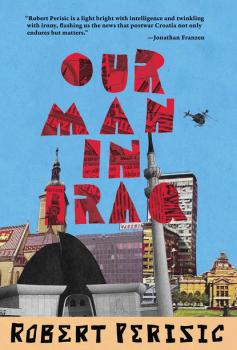ТОП просматриваемых книг сайта:
Robert Perisic
Список книг автора Robert PerisicАннотация
"Robert Perisic depicts, with acerbic wit, a class of urban elites who are trying to reconcile their nineties rebellion with the reality of present-day Croatia. . . . The characters' snide remarks could easily sound cynical but the novel has a levity informed by the sense of social fluidity that comes with democracy."—The New Yorker"Robert Perisic is a light bright with intelligence and twinkling with irony, flashing us the news that postwar Croatia not only endures but matters."—Jonathan Franzen"This jivey—and I should say x-rated—story stays with us."—Alan Cheuse, «All Things Considered» NPR"Despite the serious themes, the novel is largely comic and in many ways falls into the same genre of satirical anti-war novels that includes The Good Soldier by Jaroslav Hasek and Kurt Vonnegut's Slaughterhouse Five. Perisic constructs a series of long and entertaining scenes full of quirky dialogue and rhythmic interior monologue."—The Times Literary Supplement"In this raucous and funny novel about an entire country's post-traumatic stress syndrome, Toni discovers that you can't entirely escape your past no matter how must you try to live your life in fast forward."—Huffington Post"In addition to being a delightfully acerbic primer on a literarily underrepresented part of Europe, Our Man in Iraq may well prove to be one of those rare cases where something is actually gained in translation."—Toronto Star"Given the uncountable billions of words they have dedicated to the war in Iraq, it might be easy for Americans to think of it as belonging solely to them. Even its possession by the Iraqis can feel tenuous at times. So it is a refreshing reminder of the new global village to read a novel like Robert Perisic’s Our Man in Iraq, which studies the fighting in Baghdad from the distant shores of Croatia."—Boston Globe“A must-read… brilliantly captures modern-day Zagreb.” —The Guardian"How deeply satisfying it is to hear Perisic’s wry voice take a different angle, and tell a different story."—ZYZZYVA"This smart, cutting book powerfully illustrates the horrible hangover of war."—Publishers WeeklyOne of The Millions most anticipated books of 20132003: As Croatia lurches from socialism into globalized capitalism, Toni, a cocky journalist in Zagreb, struggles to balance his fragile career, pushy family, and hotheaded girlfriend. But in a moment of vulnerability he makes a mistake: volunteering his unhinged Arabic-speaking cousin Boris to report on the Iraq War. Boris begins filing Gonzo missives from the conflict zone and Toni decides it is better to secretly rewrite his cousin’s increasingly incoherent ramblings than face up to the truth. But when Boris goes missing, Toni’s own sense of reality—and reliability—begins to unravel.Our Man In Iraq, the first of Robert Perisic’s novels to be translated into English, serves as an unforgettable introduction to a vibrant voice from Croatia. With his characteristic humor and insight, Perisic gets to the heart of life made and remade by war.
Аннотация
A journalist, whose marriage is at the point of collapse, sends his cousin out to report on the war in Iraq in his absence. It's not long before things begin to unravel. While he struggles to hold on to his actress girlfriend, his cousin goes missing. Marriage, job and family are all at stake in Our Man In Iraq this comic take on the conflict in Iraq, told from the Balkans, where politics, nepotism and journalism seem inextricably linked.
''In general terms, there are only a few tests of a good book. The first and really big one, however, is whether you want to know what happens next. The second, which obviously does not apply if you are reading science fiction or a historical romance, say, is whether you think, «„Yes, exactly!“» about descriptions of people and places. I am not Croatian, but I am a journalist and I know lots of the people in this book not literally, of course, but I recognise their characters. All the way through, not only did want to know what happened next, but I kept thinking, «„Yes, exactly!“»' Tim Judah, Balkans correspondent for The Economist
''In general terms, there are only a few tests of a good book. The first and really big one, however, is whether you want to know what happens next. The second, which obviously does not apply if you are reading science fiction or a historical romance, say, is whether you think, «„Yes, exactly!“» about descriptions of people and places. I am not Croatian, but I am a journalist and I know lots of the people in this book not literally, of course, but I recognise their characters. All the way through, not only did want to know what happened next, but I kept thinking, «„Yes, exactly!“»' Tim Judah, Balkans correspondent for The Economist


